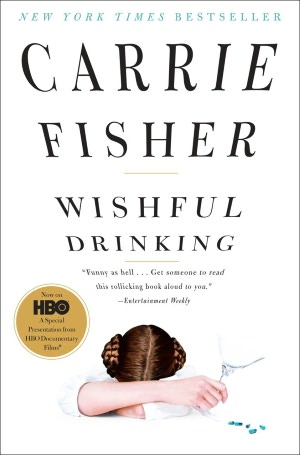This may as well be Carrie Fisher's book Wishful Drinking, a text adaptation of her successful one-woman stage show. Really, without much exaggeration, the paragraph above could well represent the entire lightweight 150+ pages. It's patently a cash-in from the stage show, which was was designed to be a humorous recollection of what led her from famous parents, through Star Wars to Simon, addiction and commitment to various asylums. Unfortunately this sight-gag-reliant, disjointed and vague approach is acceptable (even desirable) in a spoken word performance, it falls flat as a text.
 |
| Image courtesy: barnesandnoble.com |
She gets more serious - but not much, given her stated aim of finding humour in the blackness - when writing of her issues with mental health. The book ends with a moving one-page tribute to those similarly afflicted, pleading for their everyday battle needs to be respected rather than shunned. Fittingly and redeemingly, it is the most coherent and lucid page of the entire book. The narrative style means Fisher's constant struggle with mental illness is danced around, but is the gravitas keeping the book from being not so much light as vaporous.
There is every chance my answer to the archetypal profile question "Who would you most like to have dinner with?" would include Carrie Fisher. This would be for reasons of then and now. (The second clip actually boasts many/most of the book's best gags.) While the botox-free 1982 version would be welcome for re-living my childhood and teen years, the 2012 edition would provide a completely different perspective on almost every conversation. As much as my teen self hates my 2012 version for writing it, this year's Carrie Fisher would take a seat at my table. However, this still can't make me recommend her book too highly - marbles - it loses something in translation. See the show instead.


No comments:
Post a Comment